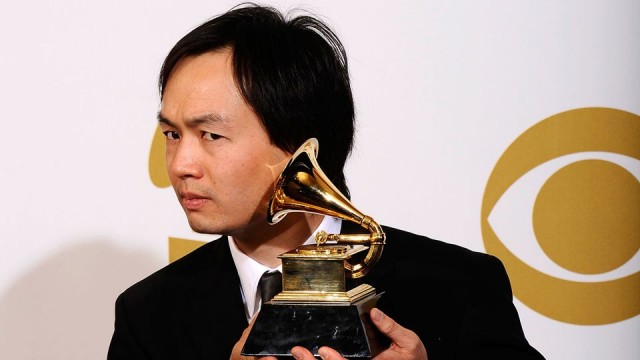Fellow Hideo-ite Chris Pasillas discussed the worthiness of video game music in concert halls in his last blog post. Funnily enough, this week expands a bit on that concept in a much larger arena: The Grammys.
The Recording Academy has decided to restructure certain genre categories to either expand or consolidate nominees. While some of them have gotten negative backlash (metalheads, still reeling from Jethro Tull’s win over Metallica back in 1988, have hung their heads even lower in disgust over the new singular ‘Best Hard Rock/Metal Performance’ category), many are citing the inclusion of video game music nominations into four new categories as a progressive, positive step in the right direction for the Recording Academy. The four categories in which video game music can be considered are as follows:
- The Music for Visual Media (Motion, Television, Video Game Music, or Other Visual Media)
- Best Compilation Soundtrack for Visual Media (Motion, Television, Video Game Music, or Other Visual Media)
- Best Score Soundtrack for Visual Media (Motion, Television, Video Game Music, or Other Visual Media)
- Best Song Written for Visual Media (Motion, Television, Video Game Music, or Other Visual Media)
Although it hasn’t been explicitly stated as the reason for its inclusion, one could potentially see the winner of this year’s 2011 Grammy for “Best Instrumental Arrangement Accompanying Vocalists” as the catalyst for change: Christopher Tin’s “Baba Yetu”, a.k.a. strategy game Civilization IV‘s opening theme. Nominated as part of Tin’s solo debut album, the 2005 theme made history as the first video game music composition to ever win a Grammy. A great success indeed, but when I read about it back in February, I felt that it wasn’t a wholehearted win for video games as it was recognized as a composition by an individual; it wasn’t submitted as the theme from Civilization IV (Tin’s album titling of the track is absent of any reference to the game itself as well; it just mentions the featured performer). Plus, Civilization IV came out in 2005. It took the Grammys five years to recognize its worth! Better late than never I suppose.
However, with this new category shakeup, we can avoid late discoveries of well-written video game music and shine a metaphorical spotlight on the importance, relevance, and vitality of video game compositions. I’m definitely looking forward to seeing what ultimately gets nominated this coming year… however, I do have some hesitations about it.
For instance, I wonder if the potential candidates will fall victim to the “popularity” effect the main televised Grammy awards tend to have. Will Modern Warfare 3’s score have a stronger consideration over, say, Battlefield 3, because the game (will have hypothetically) sold 439,012,459,302^3 copies? I certainly hope not. But then again, I hoped that the Black Eyed Peas wouldn’t get 6 nominations for selling an ungodly amount of copies of their latest album… look what happened. Now, I know it’s not really fair to compare video game music to pop music Grammy nominees, but let’s face it: The Grammys aren’t exactly the yardstick of musical taste when it comes to certain categories. Maybe the fact that none of these categories are televised means this won’t even be an issue. But who knows?
The inclusion of video game music as possible nominees also raises the question of how the music will be actually judged and experienced in order to garner a proper nomination. In a visual media category, I’m sure it’s not an issue for the Recording Academy to watch a 2-hour movie to see a film score in context. But will they play a 40+ hour game like Mass Effect 3 to properly judge Clint Mansell’s (most likely brilliant) score for the game? Or will they suggest to BioWare that a 2-3 hour edit of the cutscenes be submitted for review? And wouldn’t that impede upon the overall impact/reaction to a video game score? Definitely something to think about.
Now, I don’t want to come off too negative: I think the inclusion of video game compositions as candidates in visual media categories is fantastic. Say what you want about the Grammys, but to have a high-level, traditional institution recognizing that video game music has enough credibility to compete against film and television scores says a lot about the current state of video game music. I just wonder how it’ll be handled and how it will continue to evolve. Whatever the result, I’m sure it’ll beat the credibility of the G.A.N.G. Awards, who, while saying they “review the best in game audio over the past year”, gave Video Games Live (essentially themselves) the award for Best Soundtrack Album, a category filled with nominees from actual video games.









